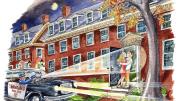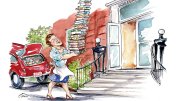1927
“To vagabond,” i.e., “to rove around classrooms where one does not belong,” has entered the undergraduate vernacular. The Bulletin reports a noticeable increase in the practice during the fall, as Crimson editors have begun printing daily lists of lectures deemed to be of general interest.
1932
Memorial Church, built in honor of the Harvard dead of “the World War,” is dedicated on the morning of Armistice Day.
1942
Gasoline shortages translate to a higher bike-theft rate, causing the City of Cambridge to mandate bicycle registration and licensing to make apprehending two-wheel thieves easier.
1982
Though MIT pranksters disrupt The Game with an inflatable “bomb” that erupts from the earth in front of the Crimson bench to blow up in a cloud of gray smoke, Harvard wins 45-7.
1987
Sally H. Zeckhauser becomes the first woman to serve as a Harvard vice president. The new administrative VP previously spent eight years as president and CEO of Harvard Real Estate Inc.
1992
The Faculty of Arts and Sciences approves a new undergraduate concentration in environmental science and public policy that will require students to study fields as diverse as chemistry and economics in a “broad integration of science and policy.”
Harvard has “locked the doors and [thrown] away the keys” for the Yard dorms, the editors report. The installation of card-reading devices and distribution of magnetic plastic cards to the freshmen will likely be extended to the Houses to crack down on crime, despite occasional glitches—a door held open too long for a good-night kiss summons a University police car to investigate.









